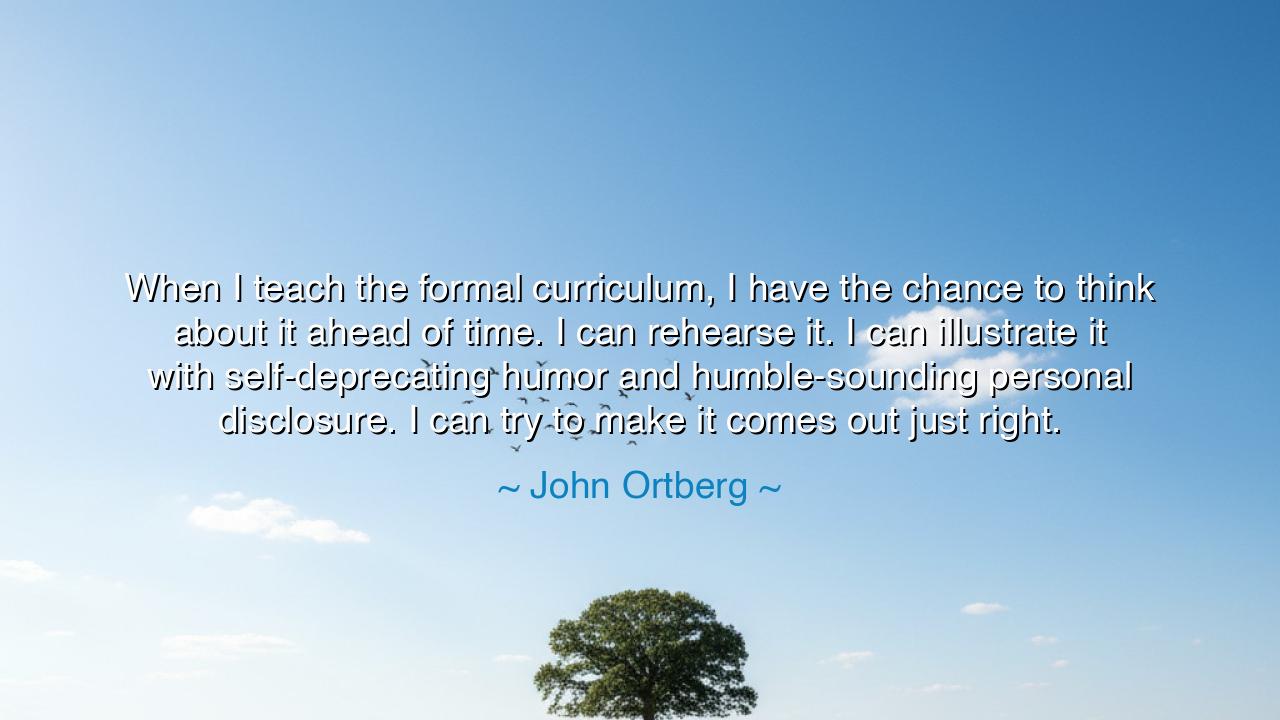
When I teach the formal curriculum, I have the chance to think
When I teach the formal curriculum, I have the chance to think about it ahead of time. I can rehearse it. I can illustrate it with self-deprecating humor and humble-sounding personal disclosure. I can try to make it comes out just right.






When John Ortberg wrote, “When I teach the formal curriculum, I have the chance to think about it ahead of time. I can rehearse it. I can illustrate it with self-deprecating humor and humble-sounding personal disclosure. I can try to make it come out just right,” he was not merely describing the craft of teaching—he was revealing the quiet art of authenticity. His words speak to that sacred balance between preparation and sincerity, between human frailty and divine purpose. Ortberg, a pastor and teacher of souls, understood that teaching is not simply the transfer of knowledge, but the shaping of hearts. To teach rightly is to blend thought and humility, truth and vulnerability, until the words become more than speech—they become service.
The origin of this quote lies in Ortberg’s own reflection on ministry, particularly his understanding of communication as a spiritual act. He knew that standing before others to teach was both a privilege and a peril. It allows one to guide, but also tempts one toward performance. Thus, he reminds himself—and those who read him—that even in mastery, there must be humility, and even in authority, there must be honesty. The teacher who rehearses carefully, who sprinkles humor and confession among his words, seeks not only to instruct but to connect. For wisdom without humility is brittle, and teaching without soul is hollow.
When Ortberg speaks of using self-deprecating humor and humble disclosure, he touches upon one of the oldest truths in human communication: that the teacher’s power lies not in perfection, but in shared humanity. The ancient philosophers knew this. Socrates, the wisest of the Greeks, began his dialogues not with proclamations of superiority, but with questions and irony—with laughter that humbled and united those around him. He, too, was a master of gentle irony, revealing through humor that wisdom begins in recognizing one’s ignorance. Ortberg stands in that same lineage, knowing that laughter born of humility is not weakness—it is bridge-building. It softens pride, opens hearts, and reminds the listener that truth belongs to all.
The humble-sounding personal disclosure of which he speaks is likewise sacred. The teacher who dares to reveal his own struggles does not lose authority—he gains trust. Consider Abraham Lincoln, whose speeches, filled with stories of hardship and moral doubt, transformed politics into moral philosophy. When he spoke of human weakness, he did not diminish his stature; he magnified his integrity. In the same way, Ortberg’s confession that he prepares, rehearses, and worries about “getting it just right” reveals not arrogance, but the humility of one who serves through words. He reminds us that every act of teaching is a kind of offering, shaped carefully yet released freely, knowing that perfection is never the goal—connection is.
In his use of humor and rehearsal, Ortberg also acknowledges that teaching is both art and discipline. The wise do not speak carelessly, nor do they rely solely on inspiration. The ancients practiced rhetoric as an act of devotion: Cicero, Demosthenes, and the teachers of old rehearsed their speeches not to impress, but to ensure that truth was honored through clarity and grace. Likewise, Ortberg rehearses his message not out of vanity, but reverence—for every word spoken to others carries weight, and every listener deserves the teacher’s best. This is the discipline of the true instructor: to prepare the mind with rigor, but to leave the heart open for the unpredictable breath of the Spirit.
Yet, the heart of Ortberg’s reflection is not about eloquence—it is about integrity. He recognizes that one can appear humble without being humble, can craft a message to sound genuine while concealing the self. And so, his words contain both wisdom and warning. The teacher must not confuse performance for authenticity. To “make it come out just right” is noble only if the purpose is love—love for the listener, love for truth, love for the One who grants wisdom. Without that love, even the finest words become noise. True teaching, like true faith, flows not from rehearsed gestures but from a life honestly lived.
Therefore, my children of thought, take this lesson deeply: prepare your words with diligence, but speak them with humility. Let your learning be shaped by laughter, and your wisdom tempered by compassion. When you teach—whether to one or to many—remember that the power of your message lies not in its polish, but in its sincerity. Do not fear imperfection; it is the proof of your humanity. Use humor to lift others, not to exalt yourself. Reveal enough of your weakness that others may find strength in it. And above all, let your words be guided by love—for only love can make truth come alive.
So, remember the wisdom of John Ortberg: “I can try to make it come out just right.” This striving is not vanity—it is devotion. It is the act of one who knows that words can wound or heal, darken or enlighten, divide or unite. Therefore, rehearse your words as an artist crafts a song—but when the moment comes to speak, release them like prayer: prepared, but surrendered. For in that surrender, the heart of the teacher meets the heart of the listener, and both are transformed.






AAdministratorAdministrator
Welcome, honored guests. Please leave a comment, we will respond soon